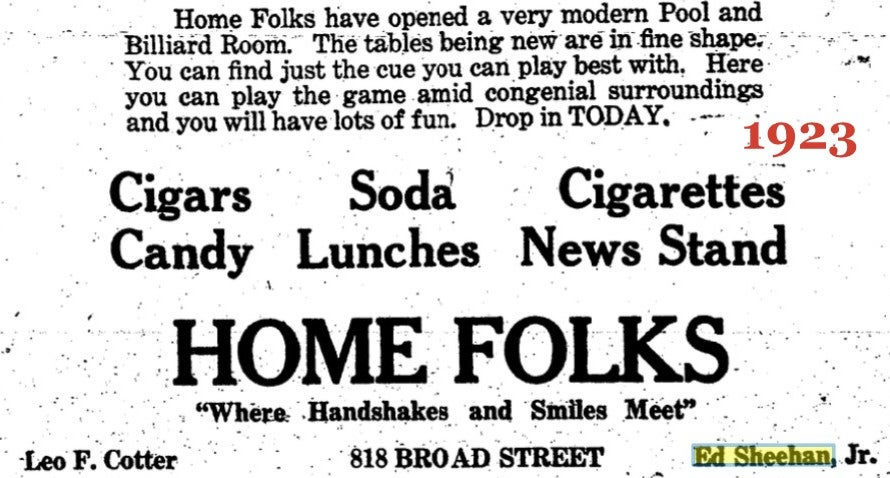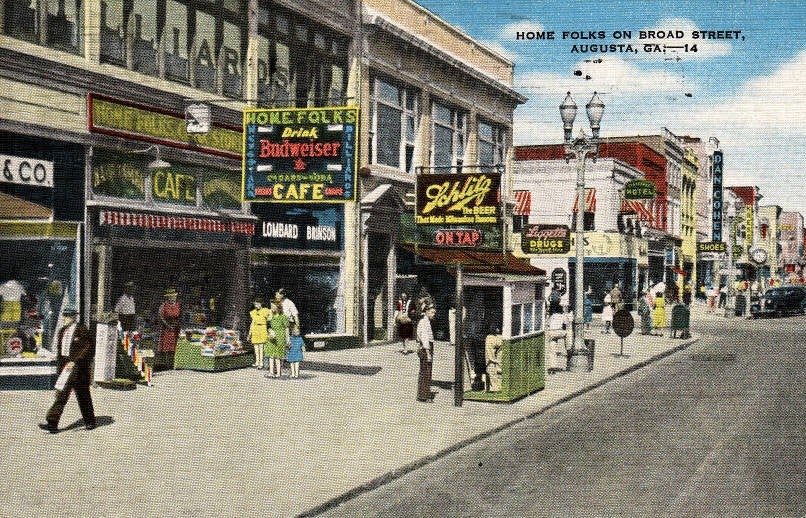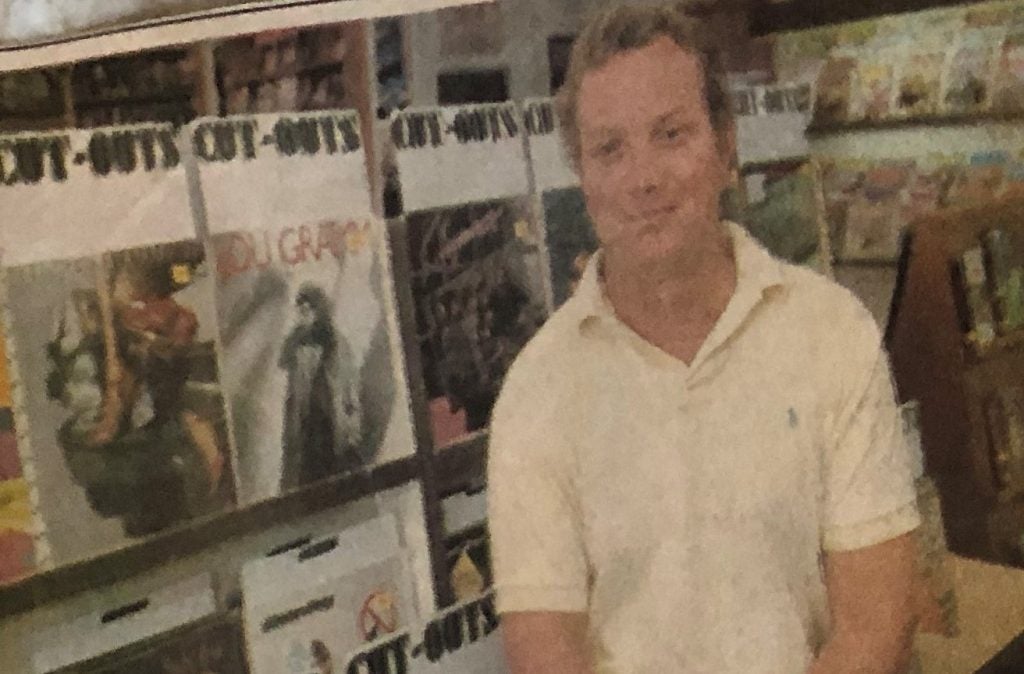When the lights went out for good on the sign proclaiming “Home Folks News and Records” in 2000, it was more than just the end of an era. It was the end of an Augusta institution that had reigned for nearly a century.
Home Folks started in Augusta on Broad Street in 1907 as a cafe with a news stand out front and a bar and billiards room upstairs. The rise of the national magazine would turn the little cafe/newsstand/bar into a go-to location for men, women and children of all ages, and Home Folks would continue to successfully evolve with the changes in society for over nine decades.
It was Ben Franklin and his competitor Andrew Bradford who introduced the magazine concept to America in 1741. However, neither man would have much luck turning a monthly periodical into money. Franklin’s “General Magazine” would only last for six months, and Bradford was out of business in half that time.
By the mid-1800s, publications such as Godey’s Lady’s Book became popular with elite women who always made sure an updated copy was prominently displayed in the parlor or best room. Meanwhile, in 1845, a man by the name of Rufus Porter created Scientific American, which was dedicated to all the new inventions being proposed and patented.
MORE: Something You May Not Have Known: Augusta’s history with bullets and bombs
The rise of inventions is what would elevate the magazine to the mass market.
By the turn of the 20th century, all types of new wonders were springing up. Electric irons, vacuum cleaners, automobiles, double-edged safety razors, crayons and Kellogg’s Corn Flakes all created the need for mass advertising, and the monthly magazine became the perfect venue for Madison Avenue.
Magazines could reach the eye of multiple readers, and they were found everywhere from doctors’ offices to mechanic shops.
Before long, every special interest from racing and sports to fashion and photojournalism had its own set of competing magazines. There were even magazines devoted to bridge building and skyscraper construction.
Robert Rautenstrauch managed Home Folks for 25 years and says he remembers the “old timers” talking about the early Home Folks and how it became a hub of the community.
“My boss, the owner, Mr. (William) Kelly Sr. told me that it was the favorite place for the New York Yankees players when they came to Augusta for spring training,” Rautenstrauch said.
Sports historian Stan Byrdy said Kelly would have been correct as Augusta was the spring home for many national ball teams including the Yankees and the Boston Red Sox during the period of 1910 to 1930. According to Byrdy, Ty Cobb was a regular fixture at Home Folks.
“Home Folks was more than just a magazine stand and sandwich shop; it was Augusta’s conduit for information,” Byrdy said.

Augusta did not get its first radio station until WRDW came on the air in 1930, but even then, radio news was spotty and the best place to go to get real time information was Home Folks. According to Byrdy, the business would have a chalkboard where sports scores and even election tallies were updated.
The 1950s gave rise to the teenager as a consumer and the then-owner, Benny Garren, wisely took advantage of the trend offering the latest rock and roll records from Elvis, Fabian, Ricky Nelson and Little Richard. Garren was also keen to keep the older crowd happy by stocking albums by Frank Sinatra and Perry Como.
Many times, the young, up-and-coming musicians would make a visit to Home Folks to sign autographs and (hopefully) sell more records.
MORE: Something You May Not Have Known: The Augusta monument the public can’t visit
That trend would continue into the mid-1980s. Rautenstrauch remembers the Allman Brothers, Bryan Adams, Kip Winger and an-up-and-coming Vanilla Ice all making stops at Home Folks.
“I remember Bryan Adams was really nice. Vanilla Ice showed up with the biggest bodyguard I had ever seen.mI was almost afraid to approach him. He wasn’t even really famous yet. ‘Ice Ice Baby’ didn’t even hit number one until a couple of weeks after he came here,” Rautenstrauch said.
One particular celebrity visit to Home Folks made it into the pages of People magazine. When the Nelson brothers were red-hot with their single “(Can’t Live Without Your) Love and Affection” at number one, Gunnar and Matthew Nelson appeared for an autograph signing that ended up lasting almost all day.
People magazine noted that Home Folks was the only record store the duo visited during their entire tour. It could be that the brothers were retracing the steps of their late heartthrob father, Ricky Nelson, who played Augusta College’s Performing Arts Theater during his musical heyday in the 1950s.
“They were really great. They signed autographs for several hours and then said, ‘Hey, let’s order pizza!’ So, we all sat in the back room and ate and then they went right back out and signed more autographs,” Rautenstrauch said.

However, as they say, nothing lasts forever, and eventually Home Folks had to face the fate of becoming obsolete.
By the 1980s, Home Folks had six locations throughout the CSRA, but the magazine world was declining. Having to compete with other forms of media for advertising meant that stand-alone magazines ended up being gobbled up by giant corporations that would, in turn, shutter the low performers.
Moreover, small family-owned shops like Home Folks that sold records and magazines found themselves competing with Walmart and other big box stores. Like many others, Home Folks found itself having to take the porn magazines from under the counter and place them on the wall.
While the “girly” magazines, as Rautenstrauch calls them, were wrapped in discreet displays, it none-the-less showed that what was once a profitable business was sliding away from market dominance to market irrelevance.

“I really didn’t want to do it, nobody wanted to do it, but it was the only way to stay in business,” Rautenstrauch said.
By 2000, with the emerging internet and streaming music on the horizon, Home Folks finally threw in the towel. However, Rautenstrauch says he is left with a quarter-century of great memories.
“The kids that worked for us were really great, especially in the early days. They thought it was a privilege to work there, and they provided such great customer service. They knew the regular customers by name,” Rautenstrauch said.
…And that is something you may not have known.
Scott Hudson is the senior reporter for The Augusta Press. Reach him at scott@theaugustapress.com












